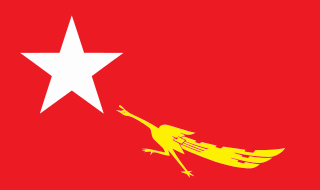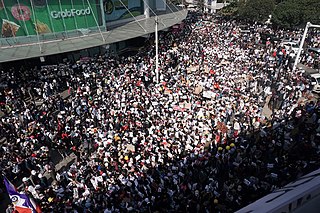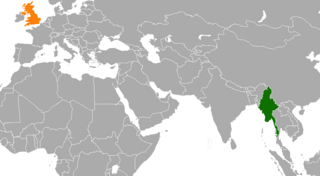
Aung San Suu Kyi, sometimes abbreviated to Suu Kyi, is a Burmese politician, diplomat, author, and a 1991 Nobel Peace Prize laureate who served as State Counsellor of Myanmar and Minister of Foreign Affairs from 2016 to 2021. She has served as the general secretary of the National League for Democracy (NLD) since the party's founding in 1988 and was registered as its chairperson while it was a legal party from 2011 to 2023. She played a vital role in Myanmar's transition from military junta to partial democracy in the 2010s.

Historically strained, Myanmar's foreign relations, particularly with Western nations, have improved since 2012. Relations became strained once more in 2017 with the Rohingya genocide and due to the 2021 Myanmar coup d'état. Myanmar has generally maintained warmer relations with near states and is a member of the Association of Southeast Asian Nations.

The National League for Democracy is a deregistered liberal democratic political party in Myanmar (Burma). It became the country's ruling party after a landslide victory in the 2015 general election but was overthrown in a military coup d'état in February 2021 following another landslide election victory in 2020.

Myanmar (Burma) and the United States had a diplomatic contact prior to the British colonial period. They established formal diplomatic relations in 1947 in anticipation of Burma's independence.

China–Myanmar relations are the international relations between the People's Republic of China and Myanmar. China and Myanmar have active bilateral relations with each other. The relation is often described as a pauk-phaw relationship, based a Burmese term for kinsfolk that implicates special asymmetric obligations between the two countries.

The Third Force is an informal group name given to a collection of political parties and local non-governmental organisations operating inside Burma. It was used mainly in relation with the 2010 general elections. Although campaigning for improvement of living conditions and for democratic change inside the country, the Third Force is seen as distinct from Aung San Suu Kyi and her National League for Democracy. The political parties participated in the November 2010 General elections while Aung San Suu Kyi's party called for a general boycott. Some state that the Third Force consists of liberal elements of the regime, more 'pragmatic' components of the opposition movement and a handful of local and foreign academics who advocated for a change in western policy of sanctions and isolation. The Third Force contains pro-democracy parties, ethnic minorities parties and locally established educational non-governmental organisations.

Wunna Maung Lwin is a Burmese politician and a member of State Administration Council. He was a Minister of Foreign Affairs under Commander-in-Chief of Defence Services Min Aung Hlaing after the 2021 Myanmar coup d'état. He previously served as the Minister of Foreign Affairs from March 2011 to March 2016. He is a retired colonel in the Myanmar Army.

Israel–Myanmar relations refers to the bilateral relations between Israel and Myanmar, established in 1953. Myanmar was one of the first countries in Asia to recognize Israel's independence and establish diplomatic ties with the state. Today, the countries cooperate in the fields of agriculture, health and education. Israel has an embassy in Yangon, and Myanmar has an embassy in Tel Aviv. Myanmar joins Singapore as one of two Southeast Asian States that do not recognize the State of Palestine.
The Special Envoy of the Secretary-General on Myanmar is a special Representative of the Secretary-General of the United Nations created in 2018 to respond to the Rohingya genocide starting in August 2017 and its effects in Myanmar. According to the mandate established by the UN General Assembly in its resolution 72/248 in 2017, the Special Envoy "works in close partnership with all stakeholders including local communities and civil society, and regional partners, notably the Government of Bangladesh and the Association of Southeast Asian Nations (ASEAN), regional countries, and the broader membership of the United Nations."

A coup d'état in Myanmar began on the morning of 1 February 2021, when democratically elected members of the country's ruling party, the National League for Democracy (NLD), were deposed by the Tatmadaw — Myanmar's military — which then vested power in a military junta. Acting President of Myanmar Myint Swe proclaimed a year-long state of emergency and declared power had been transferred to Commander-in-Chief of Defence Services Senior General Min Aung Hlaing. It declared the results of the November 2020 general election invalid and stated its intent to hold a new election at the end of the state of emergency. The coup d'état occurred the day before the Parliament of Myanmar was to swear in the members elected in the 2020 election, thereby preventing this from occurring. President Win Myint and State Counsellor Aung San Suu Kyi were detained, along with ministers, their deputies, and members of Parliament.

Protests in Myanmar, known locally as the Spring Revolution, began in early 2021 in opposition to the coup d'état on 1 February, staged by Min Aung Hlaing, the commander-in-chief of the country's armed forces, the Tatmadaw. As of 23 June 2022, at least 2000 protesters have been killed, 14,000 currently arrested and 700,000 displaced by the junta.
Sean Turnell is an Australian economist and former economic policy advisor to State Counsellor Aung San Suu Kyi in Myanmar. He is also an honorary professor of economics at Macquarie University, a former staff member of the Reserve Bank of Australia, and the director of research at the Myanmar Development Institute.

Myanmar–United Kingdom relations are the bilateral and diplomatic relations between Myanmar and the United Kingdom. Myanmar has an embassy in Mayfair, London, whilst the United Kingdom operates an embassy in Yangon.

The National Unity Government of the Republic of the Union of Myanmar is a Myanmar government in exile formed by the Committee Representing Pyidaungsu Hluttaw (CRPH), a group of elected lawmakers and members of parliament ousted in the 2021 Myanmar coup d'état. The European Parliament has recognized the NUG as the legitimate government of Myanmar. It includes representatives of the National League for Democracy, ethnic minority insurgent groups, and various minor parties.

Kyaw Tin is former union minister for International Cooperation of Myanmar. He also served as deputy minister of Foreign Affairs under Aung San Suu Kyi. As of November 2021, Kyaw Tin continued to be recognized by ASEAN as Myanmar's foreign minister.

Thinzar Shunlei Yi is a Burmese pro-democracy activist and television host. Following the 2021 Burmese coup d'état, she helped organize mass protests against the Tatmadaw. Born in Sagaing to a military family, she originally trained to become a high school teacher, graduating from the Yangon University of Education in 2013. Between 2012 and 2016, Thinzar Shunlei Yi was politically active in executive positions of several youth organizations, and later became a television host on Under 30 Dialogue, a youth-oriented television programme. In 2018, she was charged for unlawful protest against the Rohingya genocide, and was convicted in 2020. After organizing protests against the Tatmadaw in the wake of the 2021 coup d'état, she fled to the jungle and briefly joined an armed rebel group. She lives in exile in Thailand as of 2022, and runs the #Sisters2Sisters anti-wartime sexual violence campaign. She has received the Magnitsky Human Rights Award, and further honors from Women of the Future, the Obama Foundation, and the US Department of State.

Myanmar–South Korea relations are the bilateral relations between the Republic of the Union of Myanmar and the Republic of Korea. The two countries established their diplomatic relations on 16 May 1975.

In Myanmar's next general election, voters are expected to elect representatives to both the Amyotha Hluttaw and the Pyithu Hluttaw of the Assembly of the Union. The planned election would be the first after the 2021 military coup d'état. Though the military junta, the State Administration Council, initially promised to hold the election by August 2023, it has since indefinitely delayed the election in the face of increasing violence.
Events in the year 2022 in Myanmar.

Japan–Myanmar relations are the bilateral relations between Japan and Myanmar. It is sometimes referred to as Japan–Burma relations, based on Myanmar's former name Burma until 1989. Japan and Burma enjoyed good relations after the two country's 1954 peace treaty and World War II reparations agreement. Myanmar and Japan held some of the strongest ties among Asian countries, often called a "special relationship" throughout the socialist period. Japan's influence waned towards the 2000s as an ambivalent power stuck between sanctionists like the United States and new engagers like China. Japan today has retained significant political and economic influence over the Myanmar military in the wake of the 2021 Myanmar coup d'état. Japan has previously condemned the coup and the killing of peaceful protestors.


















